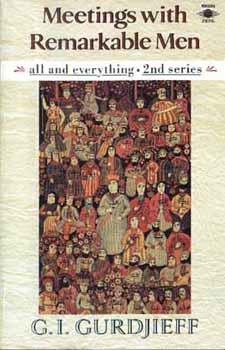Part of the Casswiki article series Books

Meetings with Remarkable Men is the second volume of the All and Everything trilogy written by G.I. Gurdjieff, first published in 1960 in France. The All and Everything trilogy also includes Beelzebub’s Tales to His Grandson (1950) and Life Is Real Only Then, When ‘I Am’ (1974).
The author started the manuscript in 1927 in Russian and revised it several times over the years. A British intellectual A. R. Orage translated this manuscript to English in 1963. This book covers the author’s childhood and the most mysterious period of his life spent in search of esoteric knowledge in the Near and Far East.
This book is semi-autobiographical to which Gurdjieff said to:[1]
“…give a form understandable for everyone to everything I have written down for the second series, in the hope that these ideas may serve as preparatory constructive material for setting up in the consciousness of creatures similar to myself a new world - a world in my opinion real, or at least one that can be perceived as real by all degrees of human thinking without the slightest impulse of doubt, instead of the illusory world which contemporary people picture to themselves.
Rather than having the book to become a complete autobiography, the author forges his work into a didactical form of his reminiscences about the “remarkable men” that he has met, beginning with his father. Then, he goes on to include his first tutor (Dean Borsh), Father Evlissi, Priest Pogossian, Abram Yelov, Prince Yuri Lubovedsky, Ekim Bey, childhood friend (Piotr Karpenko), and the professor of archaeology (Skridlov).
On “remarkable men”, the author wrote:[2]
Before going further, I consider it necessary to explain exactly the expression “a remarkable man”, since like all expressions for definite notions it is always understood among contemporary people in a relative, that is purely subjective, sense.
For example, a man who does tricks is for many people a remarkable man, but even for them he ceases to be remarkable as soon as they learn the secret of his tricks.
As a definition of who may be considered and called remarkable, I will simply say, for the present, to cut a long story short, to what men I personally apply this expression.
From my point of view, he can be called a remarkable man who stands out from those around him by the resourcefulness of his mind, and who knows how to be restrained in the manifestations which proceed from his nature, at the same time conducting himself justly and tolerantly towards the weakness of others.
The epilogue of this book entitled “The Material Question” where the author answered in a long narrative to one of the listeners’ question in a Russian restaurant in 1924 about Institute for the Harmonious Development of Man and the listeners would see how he was able to finance his enormous operations and expeditions over the years - which gives a fascinating insight into his personal struggles and his determination to succeed, and how he did it.
This book was adapted into a film Meetings with Remarkable Men in 1979. The screenplay was written by Peter Brook and Jeanne de Salzmann. The former also directed the film and the latter choreographed the dance scenes.
